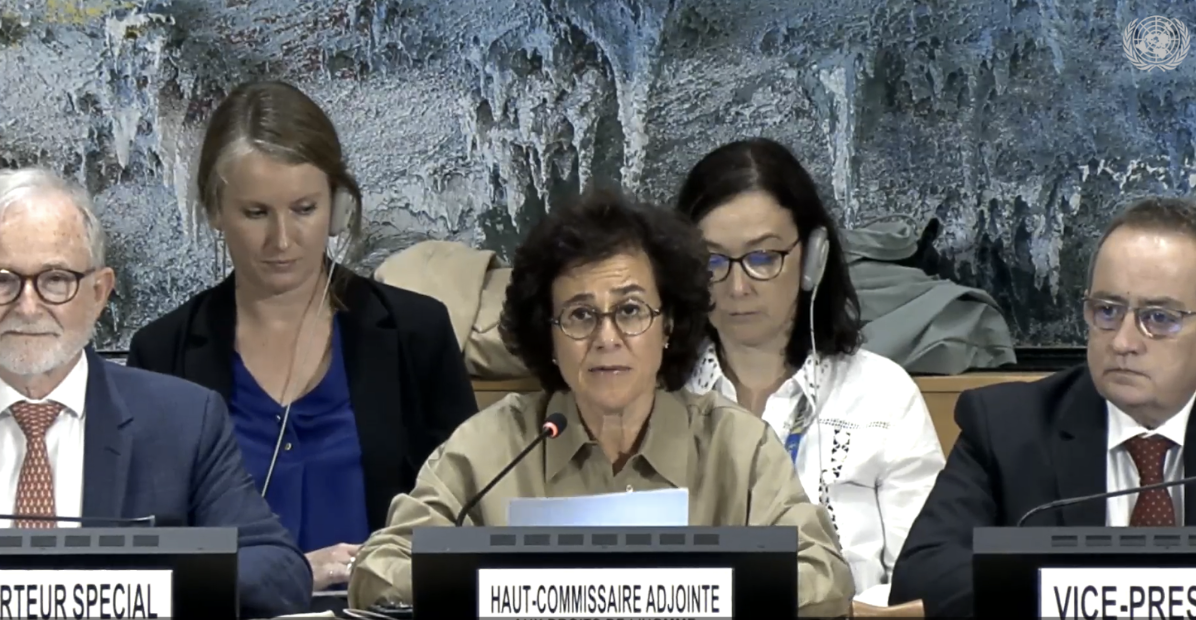
An urgent call to meet Afghan women’s bravery with decisive international action
60th Session of the Human Rights Council
8 September - 8 October 2025
Item 2: Enhanced Interactive Dialogue on Afghanistan
8 September 2025
By Stefania Plougarli / GICJ
Executive Summary
Since the Taliban's August 2021 takeover, Afghanistan has experienced a profound and deepening deterioration in human rights, women's rights, and humanitarian conditions. The de facto authorities have imposed extensive restrictions, leading to systematic gender persecution, described by international agencies as gender apartheid, effectively excluding women and girls from public life, education, and employment.
During the 60th Human Rights Council Session, a panel of experts and various state parties deliberated on Afghanistan’s human rights situation. The general remarks underscored the pervasive extreme discrimination against women and girls, as well as the ongoing humanitarian crisis. The panel also voiced strong warnings against any "creeping normalization" of the Taliban regime. There were further urgent calls made for immediate action from the Taliban to rescind discriminatory laws and end abuses, alongside pleas for international pressure, strengthened support for civil society, and the establishment of new independent investigative mechanisms to ensure accountability.
The Geneva International Centre for Justice (GICJ) fully supports these findings and expresses deep concern for Afghan women and girls living under gender apartheid. GICJ echoes the urgent calls for immediate and decisive international action, advocating for intensified pressure, targeted sanctions, and robust accountability mechanisms.
Background
Since the Taliban’s violent takeover of Kabul in August 2021, Afghanistan has experienced a profound deterioration across human rights, women's rights, and humanitarian conditions, which continues to deepen. The de facto authorities have consolidated their control through extensive restrictions on civil liberties and have reshaped governance and the justice system according to their interpretation of Islamic law. This has had disastrous effects on the overall human rights situation, which is now marked by increasing oppression and heavily curbed civil freedoms, including the silencing of media, suppression of civil society, and detention of critics.
These new restrictions have most harshly affected women and girls, who, according to various international agencies, are subdued to systematic gender persecution and gender apartheid. This has resulted in their total exclusion from public life, education, health services, employment, and other civic spaces.
Furthermore, Afghanistan remains in the grip of "one of the world’s worst humanitarian crises," which is exacerbated by economic collapse, widespread poverty, droughts, and repeated natural disasters. This major humanitarian crisis has been compounded by a devastating 6.0-magnitude earthquake that struck the valleys of eastern Afghanistan in early September, reportedly killing at least 800 people and wiping out entire villages. The aforementioned bans on female aid workers and health services are directly hampering relief operations post-earthquake, especially putting women and girls at risk of remaining under the rubble and devoid of life-saving support.
From an international perspective, there have been ongoing calls to bring the alleged perpetrators of these gross human rights violations to justice, and to support the ICC’s investigation into Afghanistan. This is especially critical given that the international community has been silently moving to a normalization of the de facto Taliban government, which would severely undermine any efforts to ensure accountability for their crimes against humanity, especially against women and girls.
Summary of expert’s report
The preliminary report by the Special Rapporteur documented the severe deterioration of human rights in Afghanistan between August 2024 and July 2025, primarily due to the restrictive policies of the de-facto authorities/Taliban government. A central and systematic issue in the report is gender persecution against women and girls, which the UN Committee on the Elimination of Discrimination Against Women (CEDAW) even suggests "may constitute gender apartheid". The August 2024 "Law on the Propagation of Virtue and the Prevention of Vice (PVPV)" formalized and expanded strict rules governing appearance (e.g. full hijab, voice concealment), mobility (e.g. male guardian requirement), and social conduct. This has led, among other measures, to the ban of women and girls from secondary and higher education, severe restrictions on employment, and limited access to healthcare. The report highlights further how the International Criminal Court (ICC) issued arrest warrants for the Supreme Leader and Chief Justice for the crime against humanity of persecution on "gender grounds".
Beyond gender persecution, the report highlighted the deepening economic and humanitarian crisis, marked by widespread food insecurity, frozen state assets, and decreasing international aid. This is also compounded by the forced return of over 2.1 million Afghan refugees in the first half of 2025, raising concerns about the international principle of non-refoulement. Civic space and media freedom are severely influenced by censorship, intimidation, and gender-based discrimination. A total of 336 human rights violations against media professionals were recorded between August 2021 and November 2024. In violation of international obligations, the Taliban government continues to carry out public executions and corporal punishment, including lashings. Victims and survivors in the report express their strong desire for impartial justice and accountability, emphasizing the need for a holistic approach that includes acknowledgement, compensation, guarantees of non-recurrence, and criminal prosecutions. The report of the Special Rapporteur concludes that no adverse measures have been employed by the de-facto government, despite calls from the international community.
Summary of the Enhanced Interactive Dialogue
“Afghanistan is a test of whether the world will stand firm against gender persecution; of whether human rights apply universally or only when politically convenient; and of whether we will challenge impunity,” stated Richard Bennett the Special Rapporteur on the human rights situation in Afghanistan, during the 60th Human Rights Council session on 8th September 2025. Together with a panel of experts on Afghanistan, the session urgently criticized the catastrophic human rights situation in Afghanistan, focusing on the role of women and girls living under oppressive discrimination and gender apartheid.
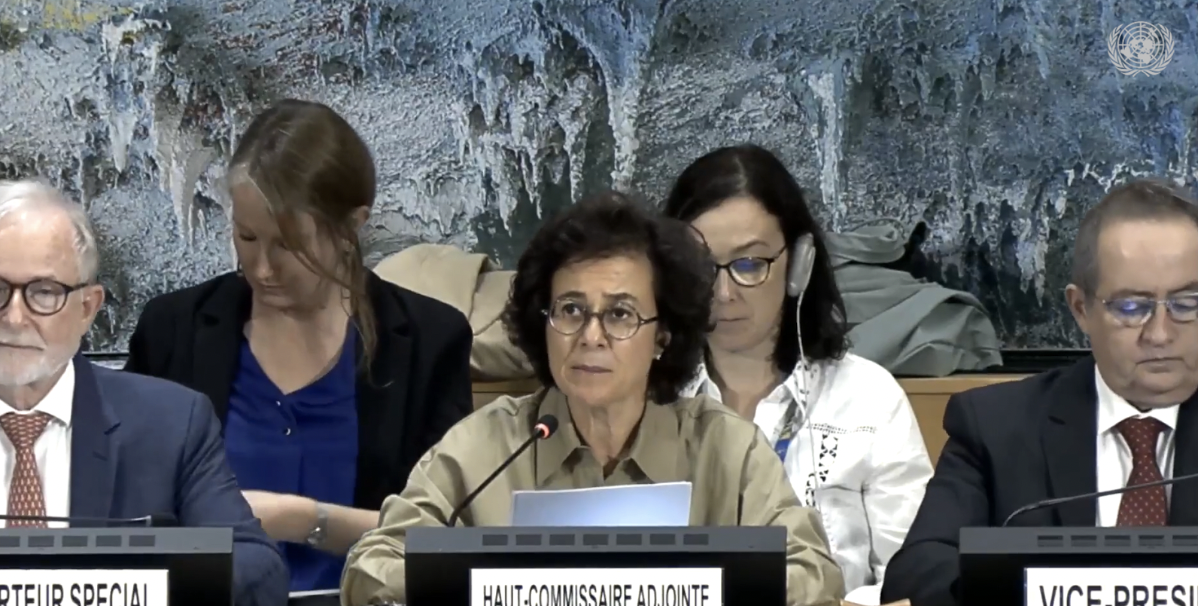
Nada Al-Sharif, Deputy High Commissioner for Human Rights, opened the session expressing her condolences to the victims of the Afghanistan earthquake. She went on to detail the pervasive extreme discrimination against women and girls, characterizing it as gender persecution that impacts every facet of life, including education, employment, health, access to civic space, and freedom of expression. Al-Sharif further noted the enforcement of laws through physical arrests and violence, severe limitations on sexual and reproductive services leading to the world's highest maternal mortality rates, and a ban on women's medical training.
She then connected the humanitarian crisis to the compounded issue of 200,000 returnees from Iran and forced returns, emphasizing the need to protect individuals against non-refoulement. Al-Sharif criticized the lack of reparations for victims from 2020/2021 and the challenging environment faced by civil society due to fear of reprisals, meanwhile advocating for listening to victims' views on justice. She called for multidimensional accountability mechanisms, encompassing the full spectrum of transitional justice, truth-seeking, reparations, and memorialization, urging international community support for independent investigations. In her words, immediate action is necessary from the Taliban in order to rescind discriminatory laws, enable access to healthcare for women and girls, end interference in their lives, and abolish corporal punishment and the death penalty. Finally, Al-Sharif emphasized the international community's need to engage with Afghan society through dialogue and incentives, pursue accountability, and meet the basic needs and aspirations of the Afghan people for a stable future where human rights are respected.
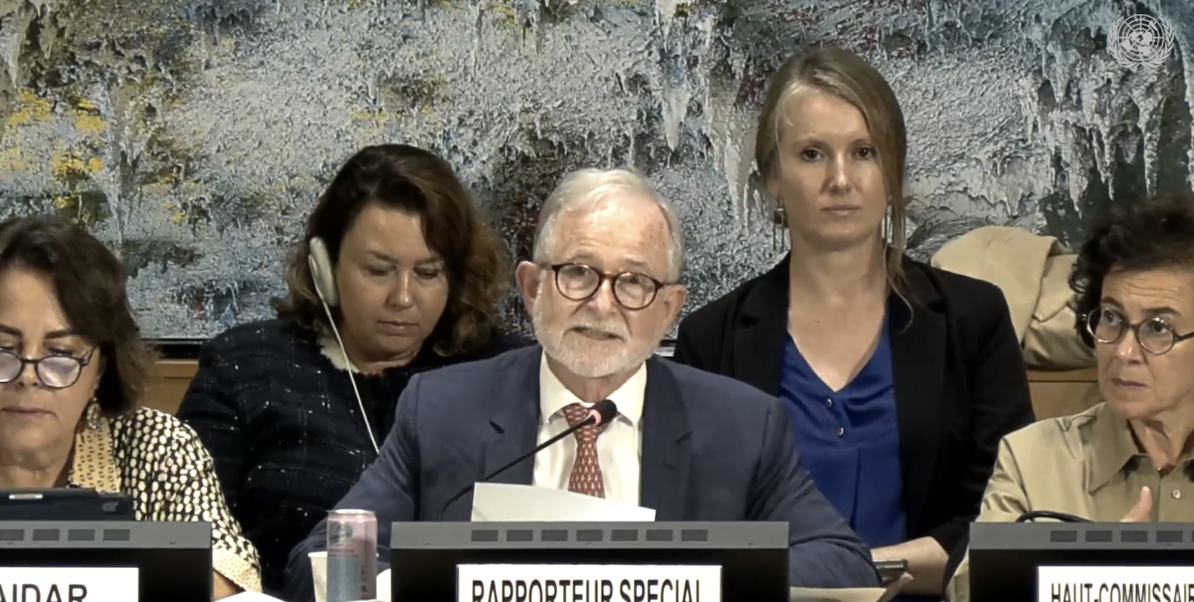 Richard Bennett, Special Rapporteur on the human rights situation in Afghanistan, echoed the sorrow regarding the earthquake and presented a similar picture of deteriorating human rights in Afghanistan since June 2025. He cited further oppressive measures such as "Maran cards," the closure of madrasa education for girls, and prohibitions on commentary by broadcasters, asserting that Afghanistan is not a safe place for Afghans. Bennett cautioned against the "creeping normalization" of the authorities and framed Afghanistan as a critical test of whether the world would firmly oppose gender persecution and uphold universal human rights, challenging the perpetuation of impunity. He advocated for utilizing all available tools, including international pressure, strengthened support for civil society, and codifying gender apartheid in international law, while centering women's voices. Bennett also called for a new, independent investigative mechanism to complement other justice efforts by collecting evidence and supporting criminal prosecution and various forms of accountability. He urged the Human Rights Council to respond with decisive action.
Richard Bennett, Special Rapporteur on the human rights situation in Afghanistan, echoed the sorrow regarding the earthquake and presented a similar picture of deteriorating human rights in Afghanistan since June 2025. He cited further oppressive measures such as "Maran cards," the closure of madrasa education for girls, and prohibitions on commentary by broadcasters, asserting that Afghanistan is not a safe place for Afghans. Bennett cautioned against the "creeping normalization" of the authorities and framed Afghanistan as a critical test of whether the world would firmly oppose gender persecution and uphold universal human rights, challenging the perpetuation of impunity. He advocated for utilizing all available tools, including international pressure, strengthened support for civil society, and codifying gender apartheid in international law, while centering women's voices. Bennett also called for a new, independent investigative mechanism to complement other justice efforts by collecting evidence and supporting criminal prosecution and various forms of accountability. He urged the Human Rights Council to respond with decisive action.
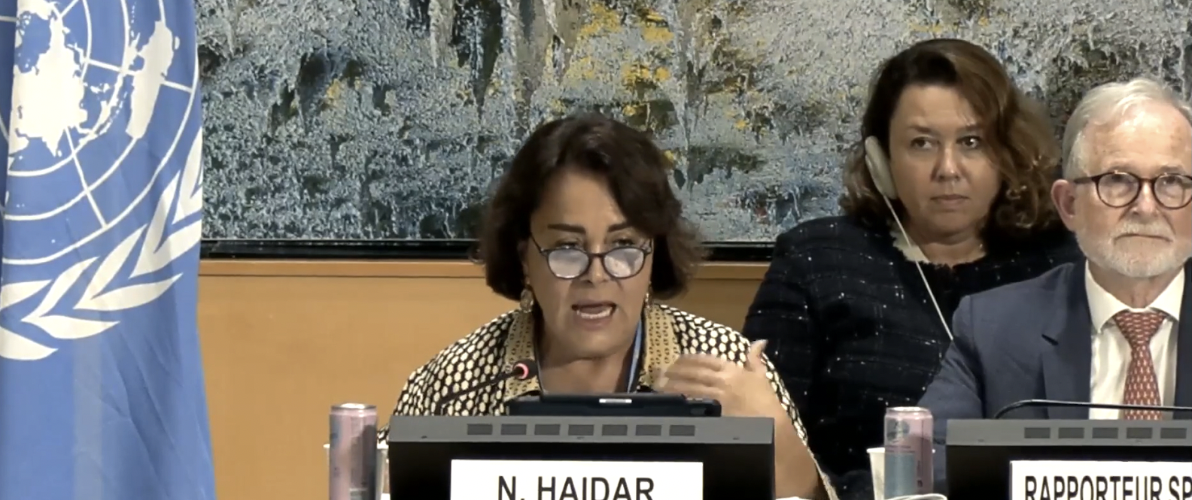 Nahla Haidar, Chair of the Committee on the Elimination of Discrimination against Women (CEDAW), characterized the situation in Afghanistan as the world's most severe women's rights crisis and gender apartheid, representing clear violations of Afghanistan's obligations under CEDAW. She contended that Sharia law does not justify institutionalized discrimination against women. Haidar further noted that the earthquake further compounded women's exclusion, visible by their exclusion from rescue missions and medical support. She lastly proposed targeted sanctions, technical assistance, and dialogue with Islamic scholars to reconcile human rights and religious beliefs.
Nahla Haidar, Chair of the Committee on the Elimination of Discrimination against Women (CEDAW), characterized the situation in Afghanistan as the world's most severe women's rights crisis and gender apartheid, representing clear violations of Afghanistan's obligations under CEDAW. She contended that Sharia law does not justify institutionalized discrimination against women. Haidar further noted that the earthquake further compounded women's exclusion, visible by their exclusion from rescue missions and medical support. She lastly proposed targeted sanctions, technical assistance, and dialogue with Islamic scholars to reconcile human rights and religious beliefs.
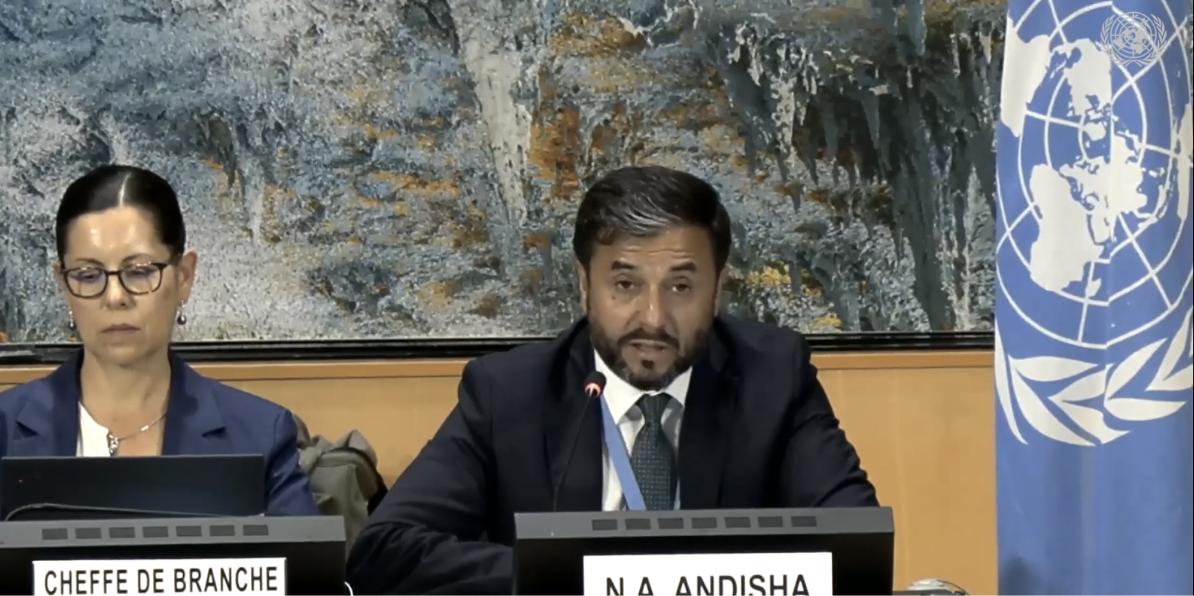 Nasir Ahmad Andisha, Permanent Representative of Afghanistan to the UN Office in Geneva, framed the situation as a human rights crisis necessitating action, also warning against the "creeping normalization" of the Taliban within the region. He stated that the situation negatively culminated recently, when the Taliban established a theocratic regime on August 15th, leading to systemic gender persecution and a multilayered crisis encompassing all rights, gender apartheid, the erasure of women and girls from public life, enforced disappearances, and torture.
Nasir Ahmad Andisha, Permanent Representative of Afghanistan to the UN Office in Geneva, framed the situation as a human rights crisis necessitating action, also warning against the "creeping normalization" of the Taliban within the region. He stated that the situation negatively culminated recently, when the Taliban established a theocratic regime on August 15th, leading to systemic gender persecution and a multilayered crisis encompassing all rights, gender apartheid, the erasure of women and girls from public life, enforced disappearances, and torture.
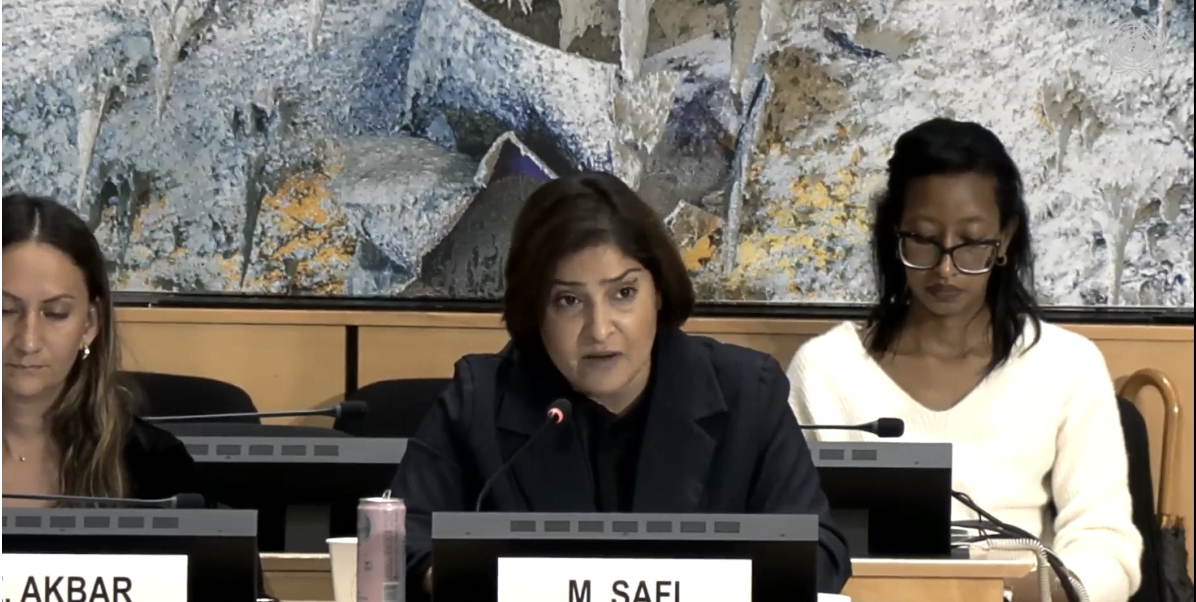
Mariam Safi, Researcher and Founder of the Organization for Policy Research and Development Studies, underscored the silencing and erasure of Afghan women through systemic violations, including the "Law on the Propagation of Virtue and the Prevention of Vice (PVPV)". She highlighted some findings from her organization’s research, mainly a rise in domestic violence, exacerbated by Taliban gender persecution, and reported that men are punished for women's "misbehavior". Safi challenged the Taliban's claims of governance, pointing to shrinking civic spaces, and forced marriages. She advocated for independent accountability mechanisms under Resolution 573 and emphasized the international community supporting civil society as a vital lifeline, asserting that "without justice, there cannot be governance.
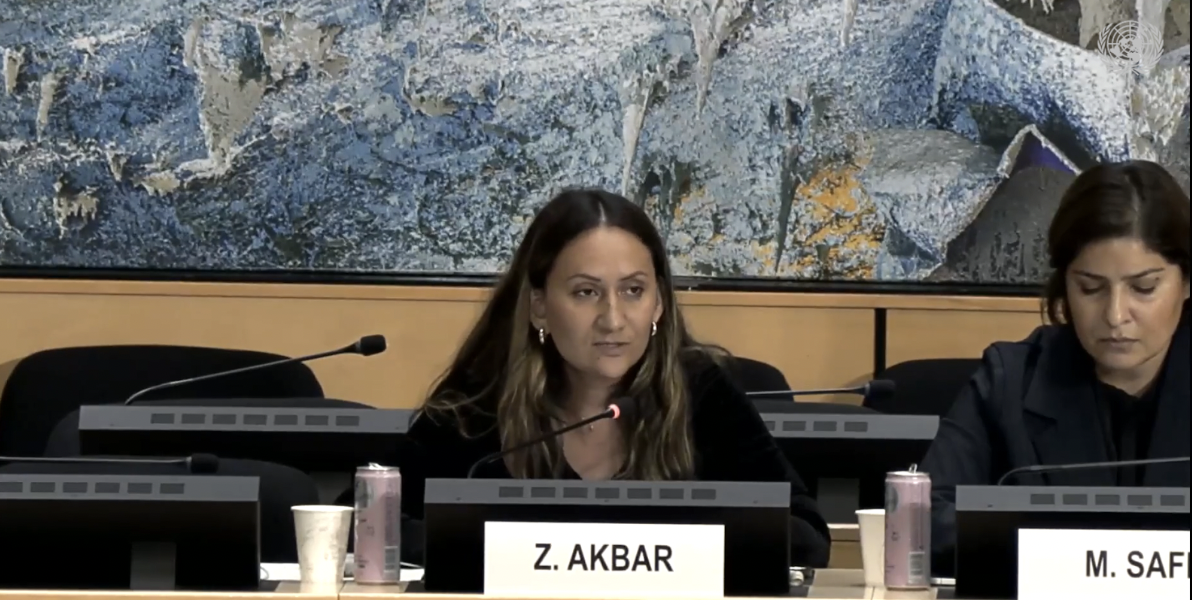 Lastly, Zubaida Akbar, Afghanistan Program Manager at Femena NGO, expressed disappointment in the council, criticizing that Afghan girls are consistently unheard and ignored. She condemned the blanket ban on education and other restrictions that steal girls' futures, noting that new laws codify these rules. Akbar described a mental health crisis resulting from women losing of authority over their lives, and characterized these measures as "deliberate tools of state terror." She also drew attention to threats and displacement of ethnic minorities and critiqued the world's "selective empathy and action" and "double standards." She urged the rejection of Taliban normalization, the pursuit of accountability, the establishment of independent mechanisms, and the guarantee of inclusive peace.
Lastly, Zubaida Akbar, Afghanistan Program Manager at Femena NGO, expressed disappointment in the council, criticizing that Afghan girls are consistently unheard and ignored. She condemned the blanket ban on education and other restrictions that steal girls' futures, noting that new laws codify these rules. Akbar described a mental health crisis resulting from women losing of authority over their lives, and characterized these measures as "deliberate tools of state terror." She also drew attention to threats and displacement of ethnic minorities and critiqued the world's "selective empathy and action" and "double standards." She urged the rejection of Taliban normalization, the pursuit of accountability, the establishment of independent mechanisms, and the guarantee of inclusive peace.
In response to the expert panel, state parties and civil society were given time and space to respond to the presentation, ask further questions, and voice their concerns and demands. 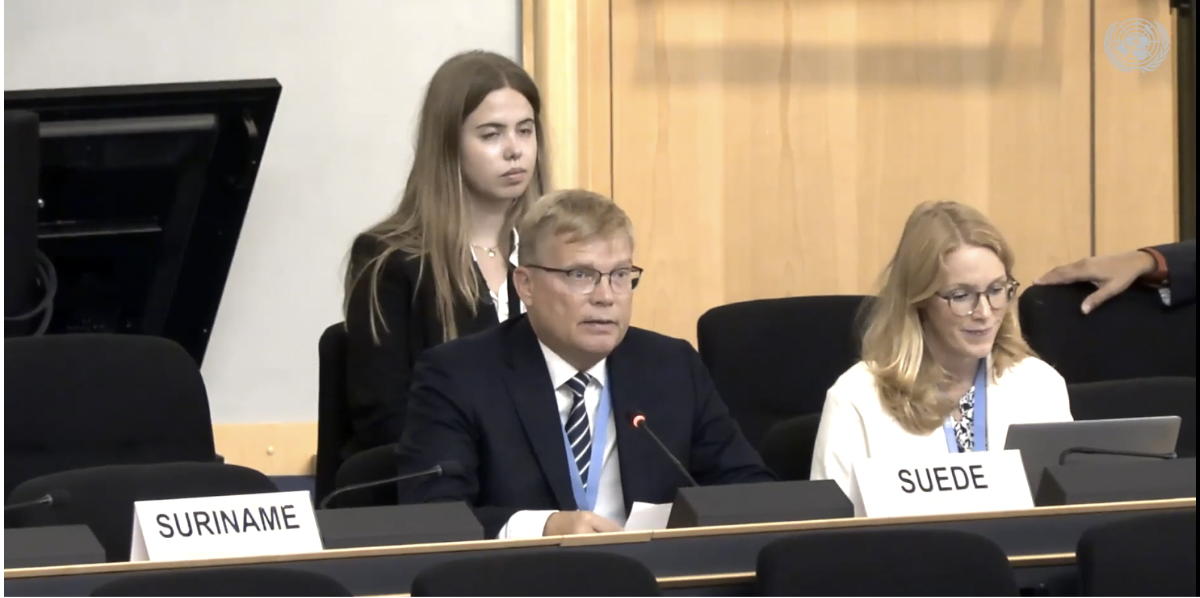 Sweden, on behalf of the group of Nordic/Baltic countries, expressed support for the Special Rapporteur and similar condolences to the victims of the earthquake. They noted a continued deterioration, with women coerced into staying at home, systematic persecution, and gender apartheid, pledging support for Afghan women in their resilience and questioning how best to support their future.
Sweden, on behalf of the group of Nordic/Baltic countries, expressed support for the Special Rapporteur and similar condolences to the victims of the earthquake. They noted a continued deterioration, with women coerced into staying at home, systematic persecution, and gender apartheid, pledging support for Afghan women in their resilience and questioning how best to support their future.
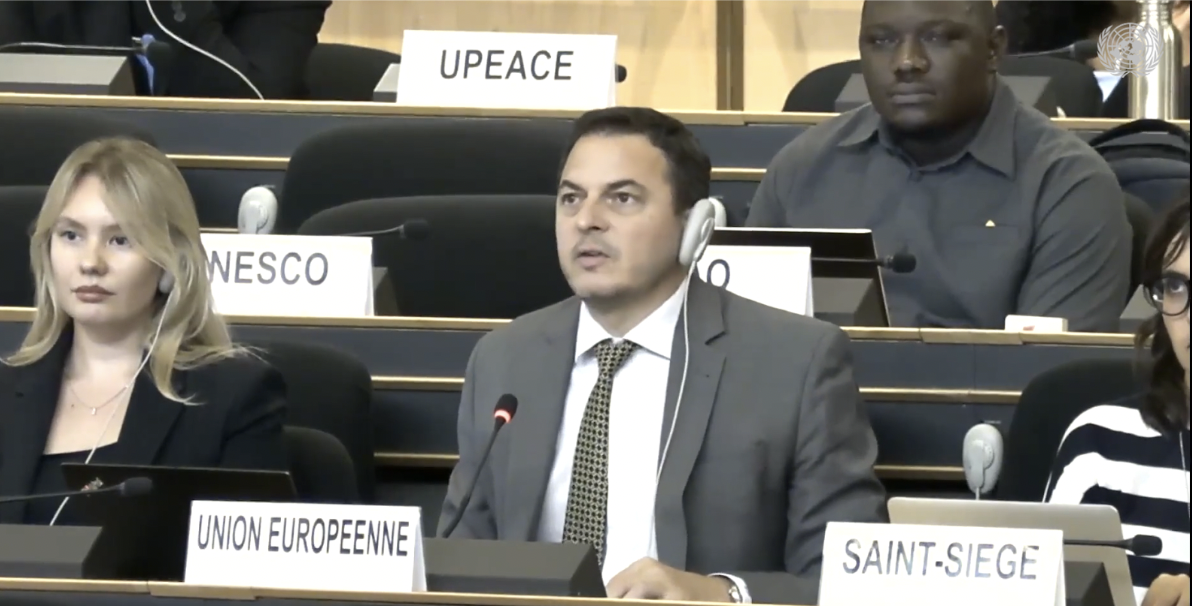
The European Union also offered condolences and strongly condemned the human rights violations perpetrated by the Taliban, highlighting systematic abuse and violations of the Rome Statute. They advocated for the support of women and minorities and urged the Taliban to comply with an Afghan-led inclusive participation for peace, also posing the question of which approach would lead to genuine change on the ground.
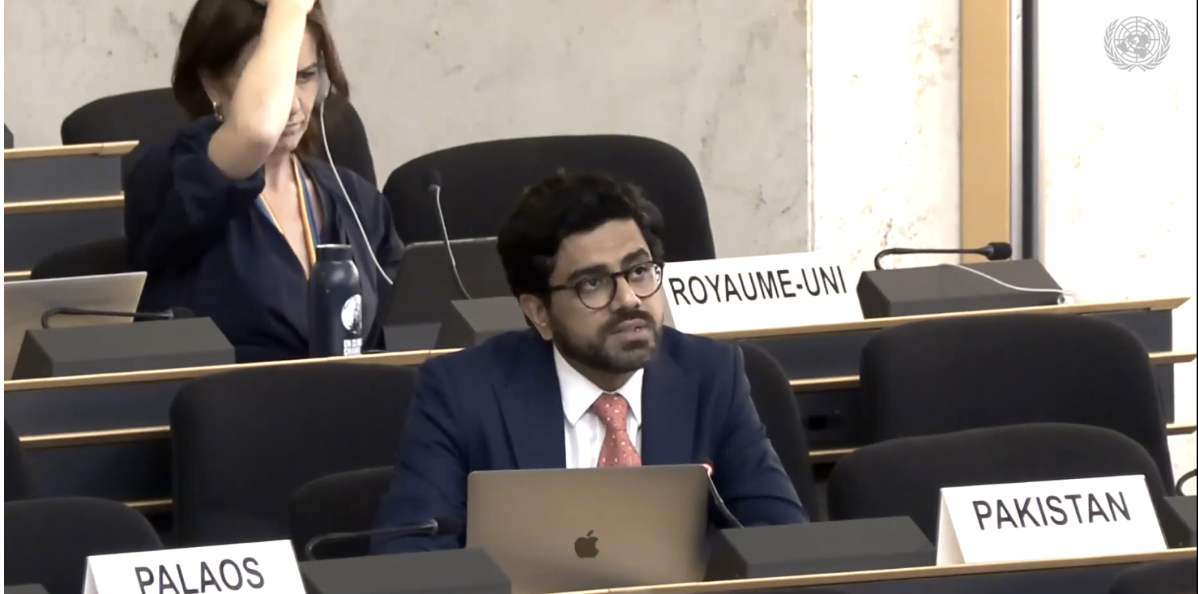 Pakistan, on behalf of the Organization of Islamic Cooperation (OIC), reiterated its deep concern for the human rights and economic situation in Afghanistan. They asserted that Islamic law and teachings provide no room for justifying discrimination and urged the Taliban to respect Afghan women's rights. Pakistan agreed with concerns regarding funding cuts and emphasized that the use of Afghan soil for terrorism undermines human rights beyond its borders.
Pakistan, on behalf of the Organization of Islamic Cooperation (OIC), reiterated its deep concern for the human rights and economic situation in Afghanistan. They asserted that Islamic law and teachings provide no room for justifying discrimination and urged the Taliban to respect Afghan women's rights. Pakistan agreed with concerns regarding funding cuts and emphasized that the use of Afghan soil for terrorism undermines human rights beyond its borders.
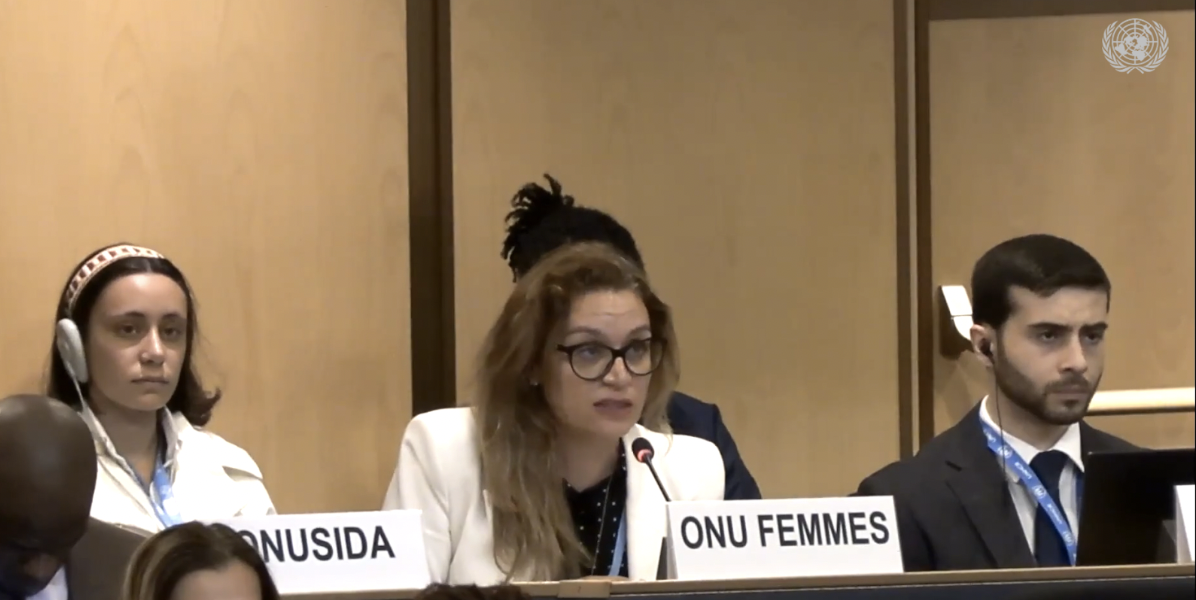
UN Women described the situation as the world's most severe crisis, with intensified enforcement of Taliban laws and sweeping restrictions forming a core pillar of their regime. They called for the international community to respond to this hope with long-term, flexible support, advocating for 30% of aid to be allocated for gender-related initiatives, and ensuring Afghan women shape the humanitarian response.
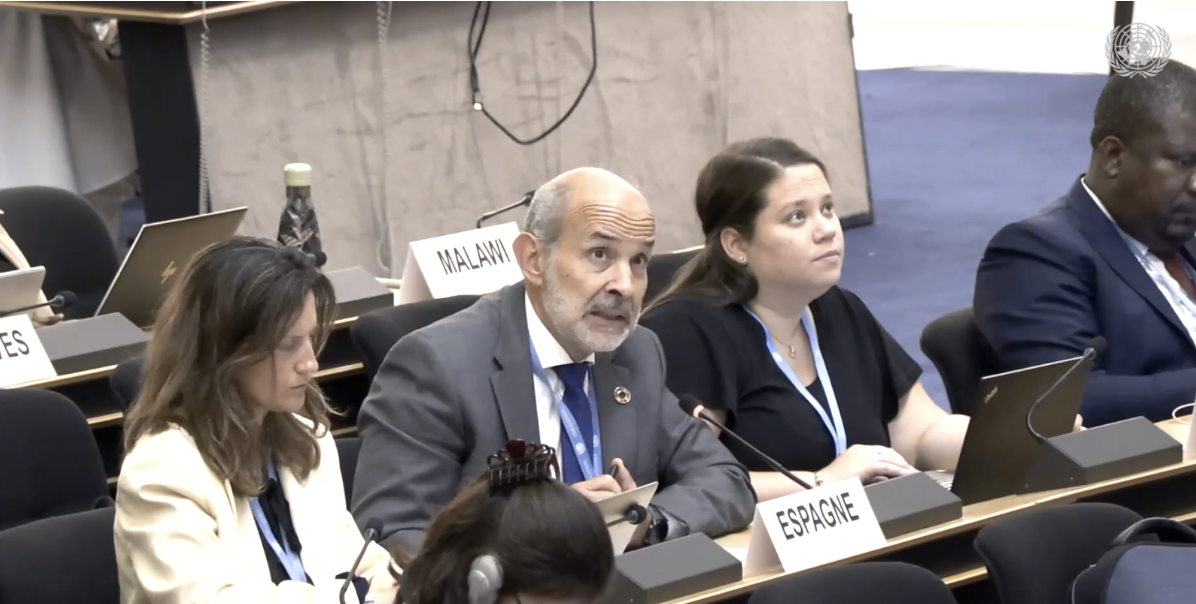 Spain noted that after four years of Taliban takeover, existing legal concepts are insufficient to support Afghan women's rights. They stated that gender apartheid cannot be normalized and urged listening to Afghan women's visions for change. Spain supported international justice mechanisms, including firm action and arrest warrants for Taliban leaders, calling for the international community to strengthen its support.
Spain noted that after four years of Taliban takeover, existing legal concepts are insufficient to support Afghan women's rights. They stated that gender apartheid cannot be normalized and urged listening to Afghan women's visions for change. Spain supported international justice mechanisms, including firm action and arrest warrants for Taliban leaders, calling for the international community to strengthen its support.
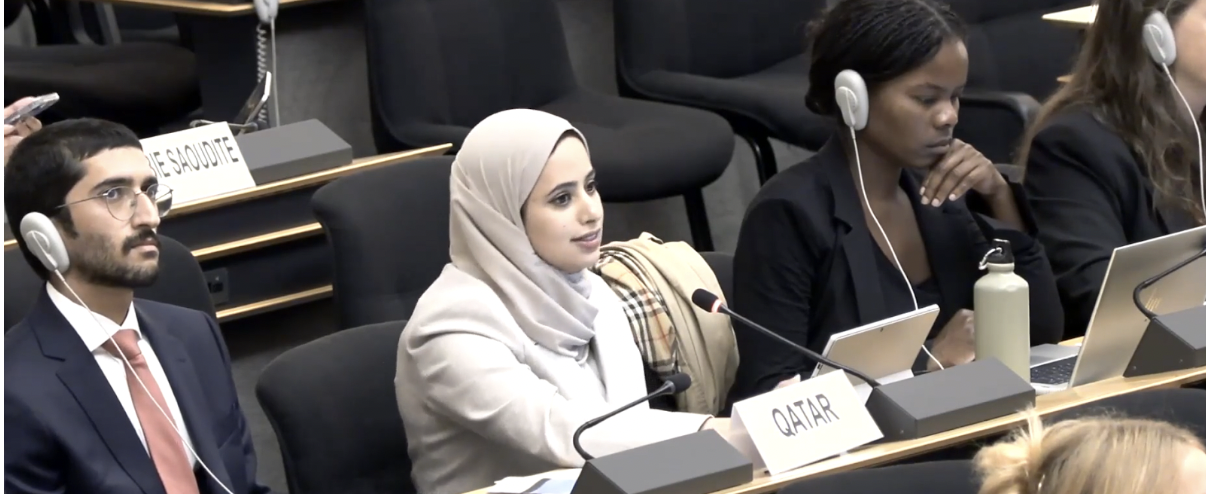 Qatar identified the economic crisis, humanitarian crisis, climate change, and the return of refugees as significant challenges. They called for international community support in rebuilding institutions and, differently from other state parties, maintaining open discussions with all parties in Afghanistan to ensure peace, emphasizing respect for Afghanistan's sovereignty. Qatar affirmed its role as a partner, providing mediation support and development aid, and advocating for women's rights.
Qatar identified the economic crisis, humanitarian crisis, climate change, and the return of refugees as significant challenges. They called for international community support in rebuilding institutions and, differently from other state parties, maintaining open discussions with all parties in Afghanistan to ensure peace, emphasizing respect for Afghanistan's sovereignty. Qatar affirmed its role as a partner, providing mediation support and development aid, and advocating for women's rights.
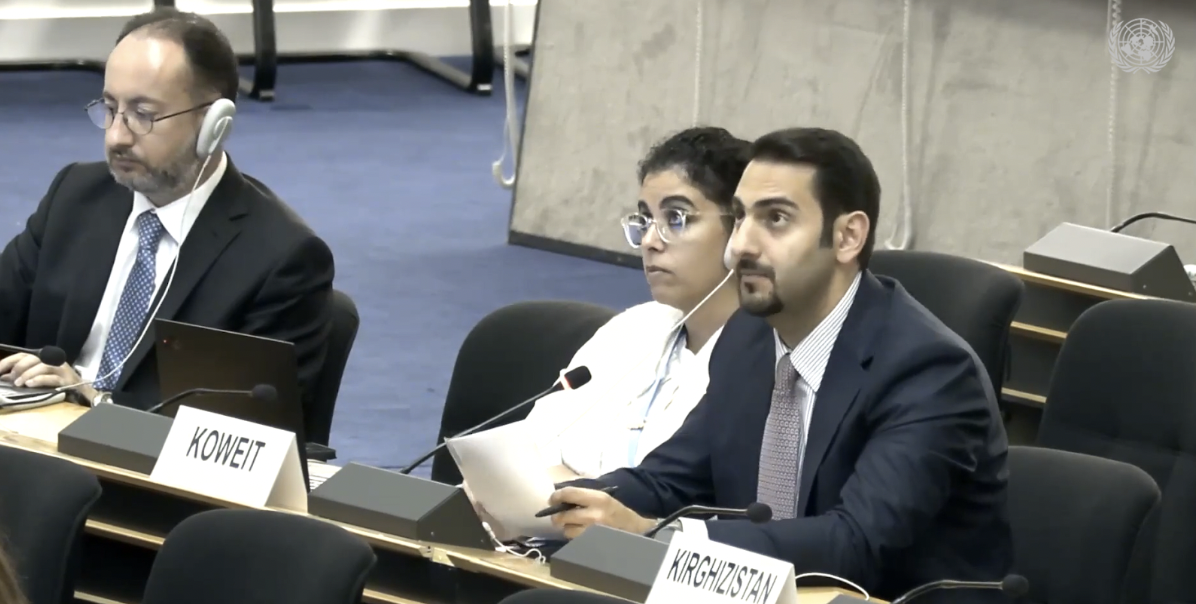 Kuwait found the Special Rapporteur’s report deeply concerning and expressed support for humanitarian and development aid. They supported mediation and open discussions, pledging to continue working with international partners to ensure human rights and peace for everyone.
Kuwait found the Special Rapporteur’s report deeply concerning and expressed support for humanitarian and development aid. They supported mediation and open discussions, pledging to continue working with international partners to ensure human rights and peace for everyone.
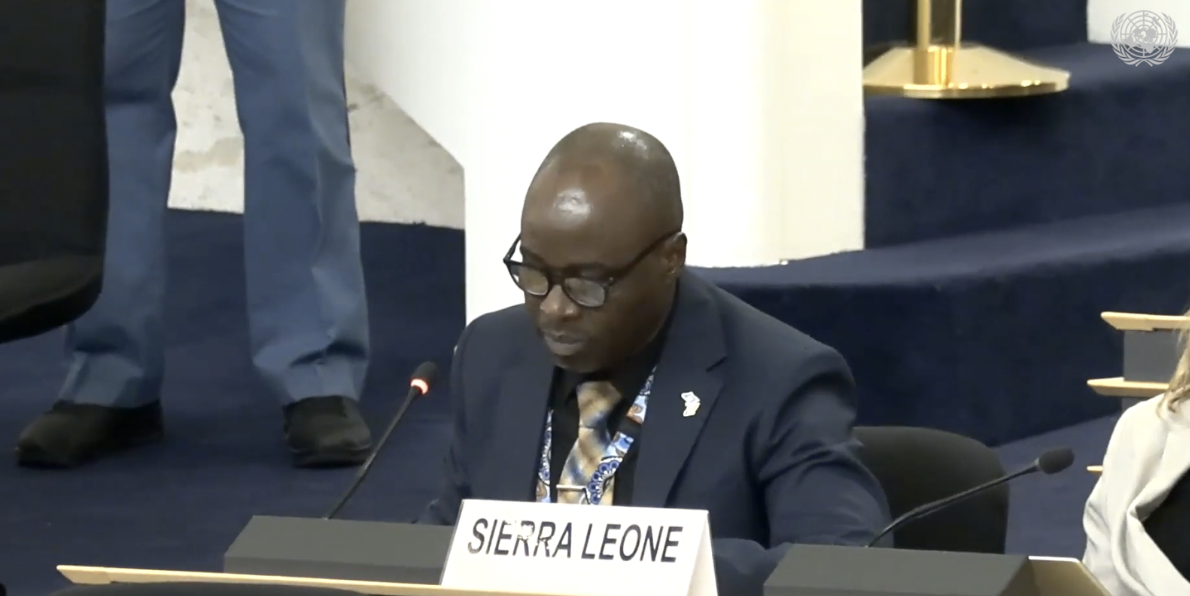 Sierra Leone acknowledged the bravery of Afghan civil society and women, and highlighted the fundamental human rights violations that particularly affect women and children. They urged the de facto government to reverse its rights abuses and abide by the CEDAW and the CRC, emphasizing the continuation of monitoring through the Special Rapporteur and calling for continued international support to combat gender apartheid.
Sierra Leone acknowledged the bravery of Afghan civil society and women, and highlighted the fundamental human rights violations that particularly affect women and children. They urged the de facto government to reverse its rights abuses and abide by the CEDAW and the CRC, emphasizing the continuation of monitoring through the Special Rapporteur and calling for continued international support to combat gender apartheid.
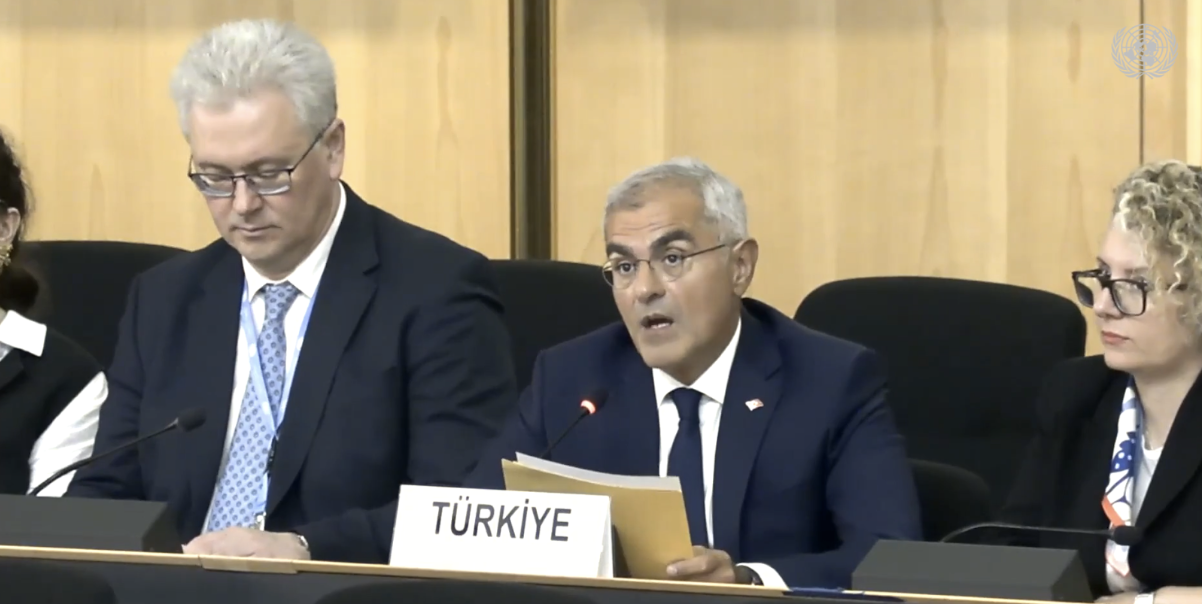
Türkiye expressed concern regarding the banning of women from education and denounced these bans. Türkiye further highlighted its active role in alleviating the suffering of Afghan women and its continued bilateral work, mentioning support for the UNDP trust fund for education and development aid.
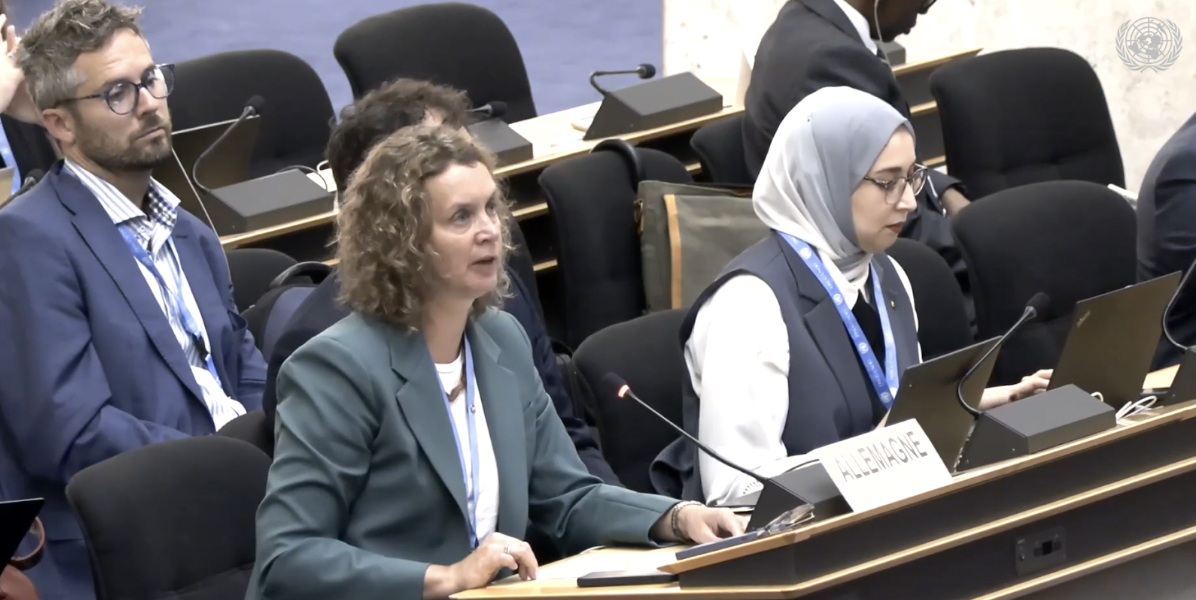 Germany described the situation in Afghanistan as a "downward spiral" under the Taliban, marked by institutional discrimination. They emphasized ensuring accountability, advocated for CEDAW implementation without reservations, and pledged their unwavering support to the people of Afghanistan, citing recent aid contributions for earthquake relief and other needs.
Germany described the situation in Afghanistan as a "downward spiral" under the Taliban, marked by institutional discrimination. They emphasized ensuring accountability, advocated for CEDAW implementation without reservations, and pledged their unwavering support to the people of Afghanistan, citing recent aid contributions for earthquake relief and other needs.
Finally, various NGOs asserted that the recognition of human rights violations under gender apartheid needs to be the necessary first step in further action. They called for not only immediate aid but also general rights, urging a move beyond mere solidarity statements. NGO speakers advocated for renewing the mandate of the Special Rapporteur and establishing independent investigation mechanisms, highlighting severe discrimination against women and minorities, mass forced deportations, and refugee returnees. They emphasized that civil society and women must be at the focus and that the council must respond.
Conclusion
In its concluding remarks, the expert panel emphasized that the international community must match rhetoric with action and strategically increase funding for the people in Afghanistan, warning that a failure to do so would not only risk “losing Afghanistan”, but rather losing the fight against global authoritarianism and accelerating a rollback of human and women's rights globally. Immediate action, rather than just statements of concern, is critical. Special Rapporteur Bennett called for ensuring accountability and supporting the mandate of the Special Rapporteur and the people of Afghanistan. He also highlighted the challenges to his work, citing a lack of resources and a liquidity crisis.. This underscores the urgent need for a comprehensive "all-tools and all-actors" approach to support women and civil society on the ground in Afghanistan.
Position of Geneva International Centre for Justice (GICJ)
Geneva International Centre for Justice (GICJ) supports the findings of the report of the Special Rapporteur, and expresses its deep concern for the women and girls stripped of their fundamental human rights, living under gender apartheid in Afghanistan. GICJ therefore echoes the urgent calls of the panel for immediate and decisive action, including the commitment of the international community to intensify pressure, impose targeted sanctions and employ accountability mechanisms. The world must meet Afghan women’s bravery with decisive action in order to ensure human rights apply for everyone in Afghanistan.




